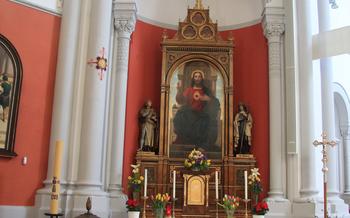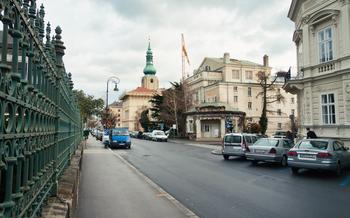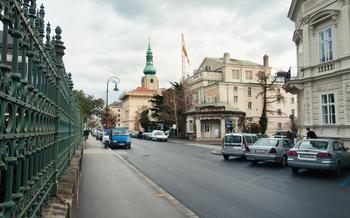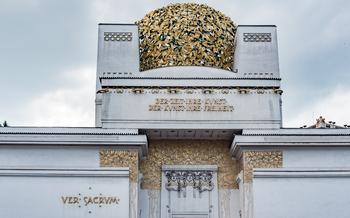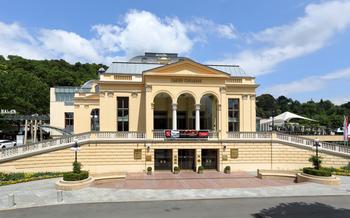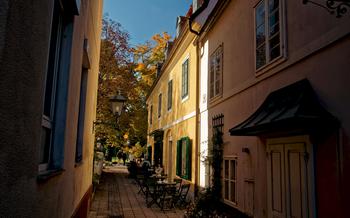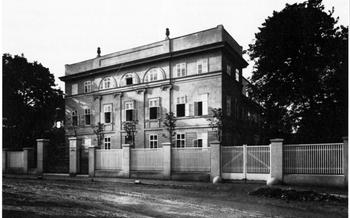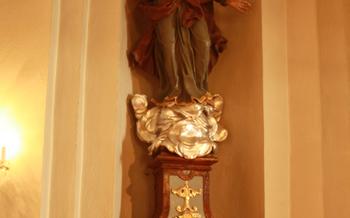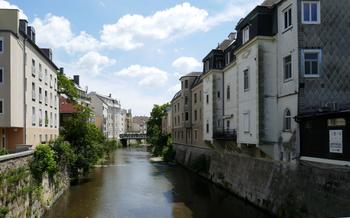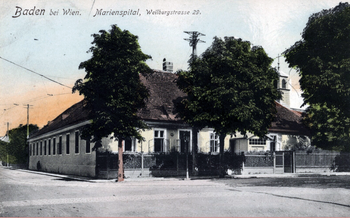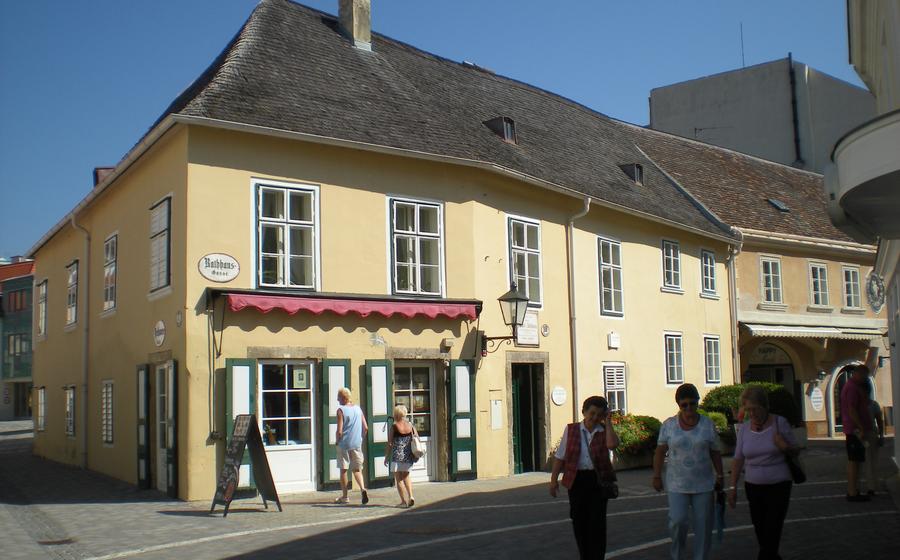
Beethovenhaus Baden
- Beethovenhaus Baden: A Musical Journey
- Exploring Beethoven's Legacy
- Guided Tours and Audio Guides
- Guided Tours in Different Languages:
- Highlights and Key Exhibits:
- Audio Guides for Self-Guided Exploration:
- Accessibility Options for Visitors with Disabilities:
- Beethoven's Compositions Inspired by Baden
- Interactive Exhibits and Hands-On Activities
- Temporary Exhibitions and Special Events
- Museum Facilities and Amenities
- Planning Your Visit
- Educational Programs and Workshops
- Research and Academic Resources:
- Digital Resources and Online Presence
- Conservation and Restoration Efforts
- Local Traditions and Cultural Significance
- Insider Tip
Beethovenhaus Baden: A Musical Journey
Located in the heart of Baden bei Wien, the Beethovenhaus Baden is a captivating museum dedicated to the life and work of the legendary composer, Ludwig van Beethoven. This historic residence, where Beethoven spent several summers between 1821 and 1823, offers a unique glimpse into his creative process and personal life. The museum houses an extensive collection of artifacts, including original manuscripts, letters, and personal belongings, providing visitors with an immersive experience into the world of this musical genius.
The exhibits at the Beethovenhaus Baden are meticulously curated to showcase Beethoven's journey as a composer, his struggles, and his triumphs. Visitors can trace the evolution of his musical style through interactive displays, fascinating anecdotes, and listening stations that bring his compositions to life. The museum also highlights the influence of Baden bei Wien on Beethoven's creative output, revealing how the town's tranquil atmosphere and natural beauty inspired some of his most iconic works.
Exploring Beethoven's Legacy
Baden bei Wien played a pivotal role in shaping the creative genius of Ludwig van Beethoven. His frequent stays in the city, spanning over several summers, proved to be a catalyst for his musical inspiration. The natural beauty of the region, the tranquility of the countryside, and the vibrant cultural atmosphere of Baden provided the perfect backdrop for Beethoven's artistic growth and experimentation.
During his time in Baden, Beethoven composed some of his most iconic works, including the pastoral Symphony No. 6, also known as the "Pastoral Symphony." This symphony is a testament to Beethoven's deep connection to nature and the picturesque landscapes of Baden. Other notable compositions created during his stays in the city include the piano sonatas "Moonlight" and "Appassionata," as well as the string quartets Op. 18, No. 4-
Beyond his musical achievements, Baden also offered Beethoven a sanctuary of peace and tranquility. He found respite from the hustle and bustle of Vienna and could focus on his creative endeavors without distractions. The city provided him with a conducive environment to explore new ideas, experiment with different musical forms, and push the boundaries of his own genius.
The Beethovenhaus Baden serves as a testament to this transformative period in Beethoven's life. Through its exhibits and displays, the museum offers visitors a glimpse into the composer's creative process and the profound influence of Baden on his artistic legacy.
Guided Tours and Audio Guides
Guided Tours in Different Languages:
The Beethovenhaus Baden offers guided tours in various languages, including English, German, French, Italian, and Spanish. These tours provide an immersive experience, allowing visitors to delve deeper into Beethoven's life and music. Led by knowledgeable and passionate guides, the tours highlight the key exhibits, share anecdotes about Beethoven's time in Baden, and bring the composer's legacy to life.
Highlights and Key Exhibits:
During the guided tours, visitors are taken through the different rooms of the Beethovenhaus, where they can see the composer's original manuscripts, musical instruments, and personal belongings. The guides provide insights into Beethoven's creative process, his struggles with deafness, and the impact of his stays in Baden on his music. Visitors can also explore the museum's collection of historical documents, portraits, and other artifacts related to Beethoven's life and work.
Audio Guides for Self-Guided Exploration:
For those who prefer a self-guided experience, the Beethovenhaus offers audio guides in multiple languages. These audio guides provide a comprehensive overview of the museum's exhibits and allow visitors to explore at their own pace. The audio guides feature expert commentary, historical context, and musical excerpts, offering visitors a deeper understanding of Beethoven's life and music.
Accessibility Options for Visitors with Disabilities:
The Beethovenhaus Baden is committed to ensuring that all visitors have an enjoyable and accessible experience. The museum is wheelchair accessible, and wheelchairs are available for visitors to borrow if needed. Guided tours with sign language interpretation can be arranged upon request. Additionally, the museum offers audio guides with closed captions for visitors who are deaf or hard of hearing.
Beethoven's Compositions Inspired by Baden
During his summer stays in Baden, Beethoven found solace and inspiration in the town's tranquil atmosphere. Surrounded by picturesque landscapes, he immersed himself in nature's beauty, which profoundly influenced his compositions.
One of the most notable works inspired by Baden is the "Pastoral Symphony" (Symphony No. 6), composed in 180The symphony is a musical depiction of the countryside, with each movement representing different aspects of nature. The serene melodies and vivid sound effects evoke the sights and sounds of Baden's meadows, forests, and streams.
Another masterpiece inspired by Baden is the "Eroica Symphony" (Symphony No. 3), composed in 180Initially dedicated to Napoleon Bonaparte, the symphony underwent a transformation as Beethoven withdrew the dedication, expressing his disillusionment with Napoleon's imperial ambitions. The symphony's heroic themes and dramatic contrasts reflect Beethoven's own struggles and triumphs.
Beethoven's love for Baden also inspired several piano works, including the "Moonlight Sonata" (Piano Sonata No. 14) and the "Appassionata Sonata" (Piano Sonata No. 23). The lyrical melodies and passionate intensity of these sonatas showcase Beethoven's emotional depth and virtuosic piano writing.
These compositions, deeply rooted in Beethoven's Baden experiences, stand as testaments to the power of nature, human emotion, and the creative genius that thrived in this idyllic setting.
Interactive Exhibits and Hands-On Activities
The Beethovenhaus Baden offers a variety of interactive exhibits and hands-on activities that bring Beethoven's music to life. Visitors can engage with his compositions through listening stations, interactive displays, and hands-on activities. These interactive elements provide a deeper understanding of Beethoven's musical genius and allow visitors to experience his music in a personal and engaging way.
One of the highlights of the museum is the "Beethoven Experience" room, where visitors can listen to Beethoven's music through high-quality headphones while watching visualizations of the music on a large screen. This immersive experience allows visitors to feel the power and emotion of Beethoven's music in a completely new way.
Another popular exhibit is the "Composer's Studio," where visitors can try their hand at composing their own music using a variety of instruments and software. This hands-on activity is a great way to learn about the creative process and to gain a deeper appreciation for Beethoven's musical genius.
For children and families, the museum offers a variety of educational workshops and programs that focus on Beethoven's music and life. These programs are designed to engage children in the learning process and to help them develop a love of music.
Whether you are a music lover, a history buff, or simply looking for a fun and educational experience, the Beethovenhaus Baden has something to offer everyone. The interactive exhibits and hands-on activities are a great way to learn about Beethoven's life and music and to experience his genius in a truly immersive way.
Temporary Exhibitions and Special Events
The Beethovenhaus Baden goes beyond a static museum experience by hosting a variety of temporary exhibitions and special events throughout the year. These exhibitions often focus on specific aspects of Beethoven's life, work, or legacy, providing visitors with a deeper understanding of the composer and his music. Past exhibitions have explored themes such as Beethoven's relationship with his patron, Prince Lichnowsky, the influence of folk music on his compositions, and the evolution of his musical style over time.
These temporary exhibitions not only enrich the visitor experience but also contribute to Beethoven scholarship and research. They showcase new perspectives and findings, challenging traditional interpretations and shedding light on lesser-known aspects of Beethoven's life and work. By presenting a diverse range of exhibitions, the Beethovenhaus Baden ensures that visitors return time and again to discover new insights into the world of this musical genius.
In addition to exhibitions, the museum hosts a variety of special events, including concerts, lectures, and workshops. These events provide a platform for musicians, scholars, and enthusiasts to share their knowledge and passion for Beethoven's music. Visitors can attend performances of Beethoven's works by renowned musicians, listen to experts discuss his life and music, or participate in hands-on workshops that explore the creative process behind his compositions.
These special events not only enhance the visitor experience but also create a vibrant and dynamic atmosphere at the museum. They bring together people from all walks of life who share a common love for Beethoven's music, fostering a sense of community and encouraging further exploration and appreciation of his legacy.
Museum Facilities and Amenities
The Beethovenhaus Baden is designed to provide a welcoming and accessible experience for all visitors. It features a range of facilities and amenities to enhance your visit, ensuring a comfortable and informative journey through Beethoven's life and music.
-
Accessibility: The museum is wheelchair accessible, with ramps, elevators, and accessible restrooms, allowing visitors with disabilities to fully enjoy and navigate the exhibits.
-
Museum Shop: Step into the museum shop to discover a treasure trove of souvenirs and memorabilia related to Beethoven and his music. From books, CDs, and DVDs to unique gifts and collectibles, you'll find something to cherish and remember your visit by.
-
On-site Café: After exploring the museum, relax and rejuvenate at the on-site café. Indulge in a delicious selection of refreshments and snacks, including traditional Viennese pastries and beverages, while immersing yourself in the ambiance of Beethoven's legacy.
-
Cloakroom and Storage: Leave your belongings securely in the museum's cloakroom or storage facilities. This allows you to fully immerse yourself in the exhibits without worrying about your personal items, ensuring a hassle-free experience.
Planning Your Visit
Planning a visit to the Beethovenhaus Baden is essential for a rewarding and enjoyable experience. Admission fees are typically charged, with discounts available for students, seniors, and groups. Guided tours are offered in various languages, providing an in-depth exploration of the museum's highlights.
To avoid crowds and ensure a comfortable visit, consider visiting during off-peak hours or on weekdays. The museum's seasonal variations should also be taken into account, as opening hours may change during holidays or special events.
For a comprehensive experience, allocate at least two hours for your visit. This will allow ample time to explore the exhibits, listen to Beethoven's music, and engage with the interactive displays. Be sure to check the museum's website or contact them directly for the most up-to-date information on admission fees, guided tours, and special events.
Educational Programs and Workshops
The Beethovenhaus Baden goes beyond a mere museum experience by offering a variety of educational programs and workshops designed to foster a deeper understanding and appreciation of Beethoven's music and legacy. These programs cater to students, groups, and individuals of all ages and backgrounds, providing unique opportunities for hands-on learning and engagement with Beethoven's works.
School Programs: Tailored educational programs are available for school groups, offering interactive workshops, guided tours, and curriculum-aligned activities that bring Beethoven's music to life for students. These programs aim to spark curiosity, enhance musical knowledge, and inspire future generations of music enthusiasts.
Adult Workshops: The museum also organizes workshops and seminars for adults, delving into specific aspects of Beethoven's life, music, and creative process. Participants can explore topics such as Beethoven's compositional techniques, the influence of his contemporaries, and the historical context of his works.
Masterclasses and Lectures: Renowned musicians, scholars, and experts are invited to conduct masterclasses and lectures, sharing their insights and knowledge on Beethoven's music. These events provide a platform for in-depth discussions, analysis, and performance, offering participants a unique opportunity to learn from the masters.
Through these educational programs and workshops, the Beethovenhaus Baden fulfills its mission to promote understanding and appreciation of Beethoven's music, while fostering a vibrant community of learners and enthusiasts.
Research and Academic Resources:
The Beethovenhaus Baden is not merely a museum but also a hub for Beethoven scholarship and research. It houses a comprehensive research library that serves as a treasure trove for scholars and researchers from around the world. This library boasts an impressive collection of Beethoven's original manuscripts, letters, and other primary sources, providing invaluable insights into the life and work of the great composer.
The museum actively collaborates with universities and academic institutions to facilitate research projects and educational initiatives related to Beethoven. These collaborations contribute to a deeper understanding and appreciation of Beethoven's music and its impact on the world.
The Beethovenhaus is committed to advancing Beethoven scholarship and ensuring that his legacy continues to inspire and enrich future generations. Through its research and academic resources, the museum plays a vital role in preserving and promoting Beethoven's heritage for the benefit of scholars, musicians, and music enthusiasts alike.
Digital Resources and Online Presence
In the digital age, the Beethovenhaus Baden extends its reach beyond its physical walls through virtual tours, online exhibitions, and an active digital presence. The museum's website offers a comprehensive virtual tour that allows visitors to explore the museum's rooms, exhibits, and artifacts from the comfort of their own homes. Additionally, the museum regularly hosts online exhibitions on various aspects of Beethoven's life and work, providing in-depth insights and access to rare materials.
The Beethovenhaus Baden maintains an active presence on social media platforms, engaging with visitors, sharing updates, and posting interesting content related to Beethoven, his music, and the museum's activities. These platforms serve as a valuable tool for the museum to connect with a global audience, promote upcoming events, and facilitate discussions about Beethoven's legacy.
Furthermore, the museum's website hosts a digital archive and database that houses a wealth of Beethoven-related resources, including digitized versions of manuscripts, letters, and other primary sources. This valuable resource is accessible to scholars, researchers, and music enthusiasts worldwide, fostering a deeper understanding and appreciation of Beethoven's work.
By leveraging technology and digital platforms, the Beethovenhaus Baden successfully reaches a global audience, enhances accessibility, and promotes the legacy of Ludwig van Beethoven to a diverse and engaged community.
Conservation and Restoration Efforts
The Beethovenhaus Baden is committed to preserving Beethoven's legacy through ongoing conservation and restoration efforts. The museum's dedicated team of experts works tirelessly to maintain the integrity of the building, its artifacts, and the composer's personal belongings. This includes regular cleaning, monitoring, and repairs to ensure that the Beethovenhaus remains a vibrant and authentic representation of Beethoven's life and work.
One of the key challenges faced by the museum is the preservation of Beethoven's original manuscripts and letters. These precious documents are susceptible to damage from factors such as light, humidity, and handling. To protect these invaluable artifacts, the museum employs specialized storage techniques and climate-controlled environments.
The museum also collaborates with external experts and institutions to conduct research and develop innovative conservation methods. This includes partnerships with universities, museums, and conservators worldwide, who share their knowledge and expertise to ensure that Beethoven's legacy is preserved for future generations.
Visitors to the Beethovenhaus can contribute to these conservation efforts by following the guidelines provided by the museum staff. This includes handling artifacts with care, avoiding touching or leaning on delicate objects, and adhering to the designated pathways within the museum. By respecting these guidelines, visitors can help ensure that the Beethovenhaus remains a place where Beethoven's music and spirit continue to live on.
Local Traditions and Cultural Significance
The Beethovenhaus Baden is not just a museum dedicated to the life and work of Ludwig van Beethoven; it is also deeply intertwined with the cultural identity of Baden bei Wien. The museum serves as a symbol of the city's rich musical heritage and its connection to one of the greatest composers in history.
Baden has a long tradition of music and the arts, dating back to the 18th century when it became a popular spa town frequented by aristocrats and musicians. Beethoven's frequent visits to Baden and his creative output during his stays there have further cemented the city's reputation as a musical destination.
The museum plays a crucial role in promoting local traditions and heritage by organizing events and festivals related to Beethoven and his music. These events not only attract visitors from around the world but also foster a sense of community and pride among the residents of Baden.
The Beethovenhaus is a living testament to the enduring legacy of Beethoven and his profound impact on the cultural landscape of Baden bei Wien. It serves as a bridge between the past and the present, connecting the city's rich history with its vibrant contemporary music scene.
Insider Tip
For a truly unique experience, visit the Beethovenhaus Baden during one of its special events or concerts. Immerse yourself in the sounds of Beethoven's music performed by talented musicians in an intimate setting, surrounded by the composer's personal belongings and the ambiance of his former home. Check the museum's website for upcoming events and plan your visit accordingly.
If you're a photography enthusiast, be sure to capture the intricate details of the Beethovenhaus's architecture, the historic exhibits, and the surrounding gardens. Don't miss the opportunity to take a photo of yourself at the grand piano in the composer's study, where he created some of his most iconic works.
To avoid crowds and ensure a more personal experience, consider visiting the museum on a weekday morning or during the off-season. This will give you ample time to explore the exhibits at your own pace and soak in the atmosphere of Beethoven's former residence.
